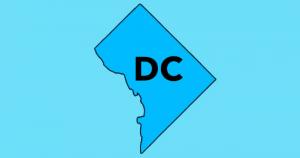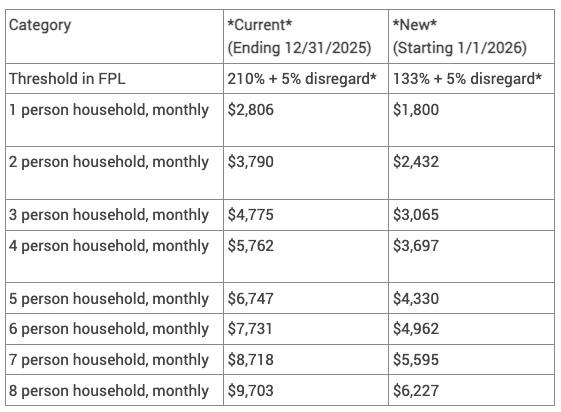District of Columbia: Medicaid up to 215% FPL is dead. Long live BHPs up to 200% FPL. *(important update)

For many years, the District of Columbia has had among the most generous Medicaid income eligibility thresholds in the country, with children and pregnant women in households earning up to 324% of the Federal Poverty Level (FPL) being eligible as well as parents earning up to 216% FPL and childless adults earning up to 210% FPL*. As a result, nearly 37% of DC's total population is enrolled in Medicaid.
The 210% FPL levels for the last two categories goes far above and beyond the ACA's Medicaid expansion provision for so-called "able-bodied" adults, which cuts off at 138% FPL, thanks to a Section 1115 Waiver put into place way back in 2010, shortly after the ACA was signed into law but years before most Medicaid expansion went into effect (h/t Louise Norris for this info):
*technically these thresholds are 319%, 216% and 210% FPL respectively, plus a 5% tax disregard.
A Quasi-Experimental Study of Medicaid Expansion and Urban Mortality in the American Northeast
...Prior to the 2014 implementation of ACA Medicaid expansion, some states utilized waivers to preemptively expand their programs sometimes with more expansive eligibility criteria, but significant gaps in coverage persisted (2).
...[District of Columbia] 12/01/10 § 1115 Waiver Early ACA expansion extends Medicaid program to 210% of FPL.
1115 Waivers typically run in 5 year terms, at which point they have to be approved for a further 5 years. I can't find the documentation, but I presume the DC waiver was extended for another 5 years through 2020 and another 5 through the end of 2025.
Well, it looks like this waiver is not being extended for yet another five years, because starting on January 1st, Medicaid eligibility thresholds for parents/caretakers and non-disabled adults is going to drop back to the same ACA expansion population levels as every other state:
Adults Without Dependent Children (Childless Adults)
Important Medicaid Updates!
Beginning January 1, 2026
- Income limits for parent and caretaker relatives will decrease from 215% to 133% of federal poverty level) FPL starting 1/1/2026 (see current and new income standards in chart below).
District of Columbia Medicaid covers adults without dependent children (childless adults) between the ages of twenty-one (21) and sixty-four (64). To be eligible for Medicaid as a Childless adult, you must be a District resident and meet eligibility requirements. There is no resource limit for this group.
Childless Adult (Medicaid) Eligibility
You may be eligible for Medicaid in the District under the Childless Adult category, if you:
- Are ages twenty-one (21) through sixty-four (64);
- Are a District resident;
- Are not disabled;
- Are not pregnant;
- Are not eligible for or enrolled in Medicare;
- Are US citizens or have eligible immigration status;
- Meet income requirements; and
- Are not caring for dependent children under eighteen (18) or eighteen (18) and a full time student
Current and Upcoming Household Income Thresholds
Figures compiled using 2025 FPL numbers as of January 15, 2025 distributed by the US Department of Health and Human Services. Figures set to change on or after January 16, 2026.
*5% income disregard is included
So, that's the bad news.
The good news is that the District of Columbia isn't simply throwing this Medicaid population to the wolves: Instead, they've chosen to become the fourth state (yes I know they aren't a state) to establish a Basic Health Plan (BHP) program under Section 1331 of the Affordable Care Act, joining New York, Minnesota and Oregon:
Section 1331 of the Affordable Care Act gives states the option of creating a Basic Health Program (BHP), a health benefits coverage program for low-income residents who would otherwise be eligible to purchase coverage through the Health Insurance Marketplace. The Basic Health Program gives states the ability to provide more affordable coverage for these low-income residents and improve continuity of care for people whose income fluctuates above and below Medicaid and Children's Health Insurance Program (CHIP) levels.
Through the Basic Health Program, states can provide coverage to individuals who are citizens or lawfully present non-citizens, who do not qualify for Medicaid, CHIP, or other minimum essential coverage and have income between 133 percent and 200 percent of the federal poverty level (FPL). People who are lawfully present non-citizens who have income that does not exceed 133 percent of FPL but who are unable to qualify for Medicaid due to such non-citizen status, are also eligible to enroll.
Consistent with the statute, benefits will include at least the ten essential health benefits specified in the Affordable Care Act. The monthly premium and cost sharing charged to eligible individuals will not exceed what an eligible individual would have paid if he or she were to receive coverage from a qualified health plan (QHP) through the Marketplace. A state that operates a Basic Health Program will receive federal funding equal to 95 percent of the amount of the premium tax credits and the cost sharing reductions that would have otherwise been provided to (or on behalf of) eligible individuals if these individuals enrolled in QHPs through the Marketplace.
Here's the DC Health Exchange Authority's summary of how their BHP program will work:
- To avoid coverage disruptions to affected populations, HBX would invite all MCOs to participate, including MCOs currently not participating in DC’s Medicaid program.
- If MCOs that currently provide coverage to DC’s Medicaid population choose to participate in the BHP, the enrollees will be able to stay with the same MCO as they have now and this would also mitigate the risk of thousands of residents being dropped from coverage once Medicaid stops paying.
Affordability of coverage and affordability of care for residents: Premiums and out-of-pocket cost for care could be zero or lower than cost in DC Health Link plans. A BHP could be designed to have no premiums and no out-of-pocket cost sharing (including no deductible, no copay, no co-insurance) for covered people. Whether there is a premium and cost-sharing depends on the amount of federal funding. Actuarial modeling is required to determine no/low premiums and out-of-pocket costs and HBX is prepared to use its actuaries from Oliver Wyman for the modeling.
Some bullets from a slideshow presentation:
- Locally, changes in the District’s revenues, increasing costs of health care, and increasing Medicaid enrollment challenge Medicaid program sustainability
- Federally, the One Big Beautiful Bill Act (OB3) includes significant changes to the Medicaid program, including:
- Work requirements for some adults enrolled in Medicaid
- More frequent eligibility checks for some adults enrolled in Medicaid
- And more
In other words, the combination of the cost of keeping the current Medicaid program in place along with the Big Ugly Bill gutting Medicaid expansion are what's led to the DC authorities deciding to go with a BHP program instead (Medicaid expansion enrollees below 138% FPL will still be subject to the Big Ugly Bill requirements, but at least this reduces the size of the population subject to those).
As of now, around 1.8 million Americans are enrolled in BHP coverage: Roughly 1.7 million in New York, around 100,000 in Minnesota and roughly 33,000 in Oregon.
Once DC's version (called the "Healthy DC Plan") ramps up, the BHP population should grow by up to nearly 25,000 more:
On January 1, 2026, About 25,000 Adults Will No Longer Be Eligible for Medicaid…And Most Will Become Eligible for the New Healthy DC Plan
- Generally, single adults with incomes around $1,800 / month or more will no longer be eligible for Medicaid based solely on their income
- Parents (in a household with two adults & two children) making around $3,700 / month or more will no longer be eligible
- Single adults and Parents above these limits with Medicare can still have Medicaid pay monthly Medicare premiums and cost sharing under QMB program
- Options for coverage will be available through the Health Benefits Exchange
- Most adults no longer eligible for Medicaid will qualify for the Healthy DC Plan
- The remaining adults will be eligible for a Qualified Health Plan
- The Healthy DC Plan is a new option through the Health Benefits Exchange and will offer no-cost coverage to eligible adults
- Many services covered by Medicaid are included except for dental, non-emergency transportation, long-term services and supports, and some mental health and SUD services
If everything is implemented smoothly, it sounds like this should be fairly seamless for the vast majority of enrollees, although it also sounds like it won't be quite as comprehensive as Medicaid currently is for that population.
The only ones who seem to be getting thrown under the bus a bit are enrollees who earn between 200 - 215% FPL, who will go from effectively zero-cost Medicaid to having to pay around 6.6% of their income for an ACA exchange QHP (plus the corresponding deductibles/co-pays/etc.) There should only be a efw thousand people in that narrow income range in DC, although it definitely sucks for them to be sure.
Anyway, here's the public facing version of the new BHP program website with basic information for enrollees. Enrollment starts November 1st along with the normal Open Enrollment Period.
IMPORTANT UPDATE: My friend & colleague Louise Norris noted that while DC is doing everything possible to make sure the new BHP program is up and running by November 1st, there's one rather important detail which still appears to have to be taken care of...
- ACA Section 1331 gives states an option to establish a BHP. A BHP is a health insurance program for moderate-income residents who are not Medicaid eligible and would otherwise be eligible to purchase coverage through an ACA Health Insurance Marketplace.
- FEDERAL: We are working with federal partners and currently waiting for federal approval.
This is from a slideshow presentation dated September 16, 2025...just 3 weeks ago.
Has federal approval been granted by the Centers for Medicare & Medicaid Services (CMS) since then? Well, not as of September 29th, according to the BHP Advisory Council Meeting minutes...
Stan Jackson shared that he has been impressed with the preparation for this process so far and asked what the strategy will be if there is a government shutdown.
- Bonnie stated that HBX is still waiting for Blueprint approval from CMS but is continuing forward with operations. If the federal government shuts down, that does not stop any of the preparation by HBX for the Healthy DC Plan.
That was ten days ago...
How to support my healthcare wonkery:
1. Donate via ActBlue or PayPal
2. Subscribe via Substack.
3. Subscribe via Patreon.




